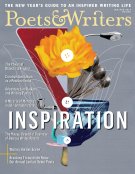Novelist and critic Caryn James once lamented in the New York Times that “resembling a Rorschach test, ‘literary journal’ is a fuzzy little inkblob of a name”—a nod to the fact that literary magazines are defined by their diversity, in both content and form. Perhaps no literary magazine offers as wide a range of content as 1913: A Journal of Forms (journal1913.org), a modernism-influenced publication taking its name from the year of the infamous Armory Show—the exhibit that first introduced international modern art to America—and Poetry magazine’s publication of Ezra Pound’s “In a Station of the Metro.” Edited and published as a print journal since 2004 by Sandra and Ben Doller, 1913 has taken its first foray into the digital realm: The current issue is available both in print and as an online document or PDF. It includes contemporary Russian poetry translations curated by Kevin Platt, a genre-dismantling collaborative essay from Thalia Field and Abigail Lang, and poetry from J. K. Daniels and Lauren Neefe. Most content for the issue was selected from 1913 contest entries, and submissions for the journal’s Spring First Book Prize, judged this year by Claudia Rankine, will open in May.
Launched last October, the Santa Barbara, California–based Miramar (miramarmagazine.org) has diverged from the digital penchants of the day, choosing instead to take its inspiration from the past. An elegant print-only poetry journal, Miramar is published on heavy, cream-colored stock, and features original woodcut illustrations on each cover. “This is an old-school poetry journal,” notes editor Christopher Buckley, “what used to be called a little magazine back in the 1960s and 1970s, though our production values are much higher.” The first issue features new poetry from established names such as Mark Jarman, Dorianne Laux, and Diane Wakoski, as well as a “Recoveries” feature of reprinted poems—work that is “lost, overlooked, forgotten, uncollected”—from Charles Simic and others. The second issue is due out in May. Miramar accepts submissions by mail from February to August.
By contrast, the Washington, D.C.–based Intentional Quarterly (theintentional.com) emerges from a distinctly contemporary vein, founded in 2012 as a print and digital venue for innovative voices from the all-too-often maligned millennial generation. Nonetheless, its editors make a stand for longevity: “We are dedicated to a meaningful analysis of our modern lifestyles, which cannot be made in 140-character shouts,” says founding editor Kate Jenkins. “I envision the Intentional as a continually evolving platform for ideas.” The second issue, released last fall, features haunting illustrations from Kreh Mellick, new poetry from Robert Lietz, and an interview with speculative designer Thomas Thwaites. The third issue is scheduled to hit newsstands this spring. The editors of the Intentional accept submissions by e-mail year-round and have a particular interest in personal and cultural essays.
Meanwhile, Philadelphia’s quirky Gigantic Sequins (giganticsequins.com) offers a more eccentric brand of literary youthfulness, providing a home for exciting new experiments in art and writing. Founded in 2009 by poet Kimberly Ann Southwick, this biannual black-and-white print journal combines the look of a simple, handmade publication with the quality of a traditional quarterly. Issue 5.1 is out this month and contains new writing from Nichole LeFebrve, Emily O’Neill, and Corey Zeller, and illustrations from Anthony Goicolea and Julia Schilling. Submissions of poetry, fiction, nonfiction, and visual art are considered via Submittable until March 1.
Seeking to create a publication that would blend the contemporary with the historical, two doctors in Mississippi launched China Grove (chinagrovepress.com) last August, to considerable attention: The debut issue features a collection of rare epistolary ephemera, including a previously unpublished letter from Mark Twain and a love letter from Pulitzer Prize winner Eudora Welty, as well as an excerpt from National Book Award winner Ellen Gilchrist’s forthcoming short story collection, Acts of God (Algonquin Books). The second issue will be released in February, and the editors plan to begin quarterly publication in 2015. Submissions are considered three times each year through Submittable; the next deadline is April 1. All submissions will be considered for China Grove’s biennial fiction and poetry contests.
Travis Kurowski is the editor of Paper Dreams: Writers and Editors on the American Literary Magazine, published in 2013 by Atticus Books. His website is traviskurowski.com.

Please log in to continue.
LOG IN
Don’t yet have an account?
Register for a free account.
For access to premium content, become a P&W member today.







